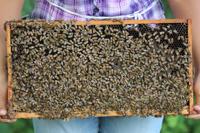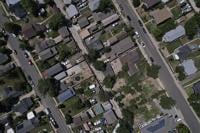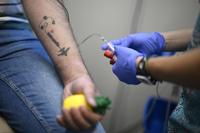The first vaccine for bees has been approved for use in Canada.
The Canadian Food Inspection Agency has conditionally licensed an oral vaccine to protect honey bees against a disease called American foulbrood, which can wipe out entire colonies if not treated.
The manufacturer, U.S.-based Dalan Animal Health, announced the Canadian approval in a news release on Oct. 16.
The vaccine can be used in Canada "under veterinary supervision," the food inspection agency said in an email.
American foulbrood is caused by the Paenibacillus larvae bacterium which produce spores that are resistant to the environment and can last for years in a hive, said Ernesto Guzman, director of the Honey Bee Research Centre at the University of Guelph.
Worker bees in the hive can transport the spores and spread the disease, Guzman said, but it's the bees in the larval stage that show clinical symptoms of infection.
"If they ingest enough of those spores, they will typically break down and putrify in the hive," added Stephen Pernal, national lead for honey bee research with Agriculture and Agri-Food Canada.
"When they do that, the bacteria multiplies and produces billions of more spores. And those spores can in fact infect other developing bees," said Pernal, who is also the officer-in-charge of the Beaverlodge Research Farm in northern Alberta.
The decomposing larvae turn dark in colour and have a fishy smell, he said.
American foulbrood disease is often treated "very judiciously" with antibiotics in North America, but there are cases where hives containing tens of thousands of bees have to be burned, Pernal said.
Having a vaccine is "another tool in our tool box" to combat the disease, he said.
Protecting honey bees from disease is "extremely important" for human food production, Guzman said.
"It is estimated that one-third of the food that we consume in western societies is produced thanks to the pollination services of bees," he said.
If the vaccine is effective, it can reduce the use of antibiotics, which "lessens the possibility that (an) antibiotic may be carried over into honey and enter the human food chain," Pernal added.
"Honey certainly is a product that is tested for various things including antibiotics, but anytime you lessen that input in the system — whether it's honey bees or the production of other livestock in Canada — that's a desirable thing," he said.
The vaccine contains dead Paenibacillus larvae bacteria and works by getting the queen bee, which lays the eggs, to ingest it. The immunity protection from the vaccine is passed along to the developing larval bees.
The vaccine is mixed into a powdered sugar and glucose syrup paste that the worker bees eat and their secretions are fed to the queen bee.
Research trials funded by Dalan Animal Health showed a 30 to 50 per cent decrease in American foulbrood infection among honey bee larvae whose queen bee received the vaccine compared to placebo hives.
The key, both Guzman and Pernal said, will be to see if the vaccine has the same effect in the real world, noting that the trials were conducted in lab-controlled environments.
"If it ends up working when more trials are conducted at the field levels, it will be a great tool to control that particular disease," Guzman said.
"(It) also may pave the way to develop other vaccines that could be useful in beekeeping and in the insect industry," he said.
The vaccine is expected to be "distributed on a limited basis to commercial beekeepers in Canada ... starting in Spring 2024," Dalan Animal Health said in a news release.
The Canadian Food Inspection Agency approved the vaccine in late September, a company spokesperson said in an email.
This report by Ďă¸ŰÁůşĎ˛ĘąŇĹĆ×ĘÁĎ was first published Oct. 20, 2023.
Canadian Press health coverage receives support through a partnership with the Canadian Medical Association. CP is solely responsible for this content.








































